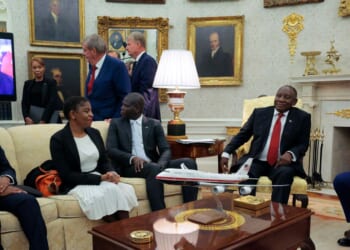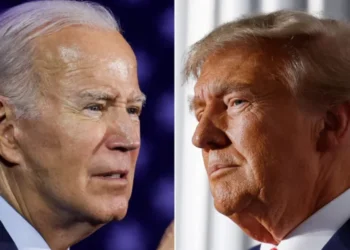Proposed cuts to the Inflation Reduction Act risk weakening U.S. industrial competitiveness and clean energy leadership, handing China a strategic advantage in future technologies.
The United States and China are in a contest for leadership of the industries of the future, including with respect to clean energy. However, while China is investing in renewables and developing pathbreaking electric vehicles (EVs), the United States is poised to send up the white flag of surrender. Unless amended, the House budget bill moving forward this week would eviscerate the tax incentives for clean energy and EVs that were part of the 2022 Inflation Reduction Act (IRA). If the House and Senate accept this language, this would be akin to unilateral disarmament, and China will be poised to dominate the commanding heights of the world’s twenty-first-century economy without even firing a shot.
China’s Model
The United States is in a long-term economic and security competition with China, and China’s model of state-led authoritarian capitalism poses profound challenges for the United States. China is seeking to absorb more countries into its orbit through an aggressive military build-up as well as leveraging trade and investment ties.
China’s scale of production has simultaneously made it the largest polluter in the world and also the largest manufacturerof clean technologies, including solar panels, batteries, and electric vehicles. The willingness of the Chinese Communist Party (CCP) to subsidize overcapacity in these industries has led to steep price declines, making it easier for other countries to buy these technologies and harder for them to sustain manufacturing sectors of their own.
Among the technologies at which the Chinese are excelling, lithium-ion batteries are particularly important, as batteries are becoming like semiconductors: key building blocks of a host of military and civilian technologies, including armored vehicles, drones, electricity systems, and cars. Countries that can manufacture, deploy, and export clean energy technology, including world-leading batteries, will be more energy secure and prosperous this century. And the wealth accrued in this area will underwrite China’s ability to fund further investments in the People’s Liberation Army.
The United States Lags in the Energy Transition
As its advocates frequently remind us, fossil fuels continue to provide a large share of both the United States’ and the global energy mix. However, renewable power is now the cheapest source of electricity in many parts of the world. Battery storage systems are increasingly able to manage the problem of intermittency by storing energy for when the wind doesn’t blow or the sun doesn’t shine. Almost every country in the world, except the United States, now realizes that renewable power and next-generation batteries are the future of electricity.
Electric vehicles are similarly revolutionizing the transportation sector. For most uses, the days of the internal combustion engine are numbered. In China, electric vehicles are now cheaper than comparable internal combustion engines and far less expensive than they are in the United States and Europe. As a result of their superior performance and value, half of all new vehicle sales in China are some form of electric, up from negligible levels just a few years ago.
IRA Rollbacks Could Undercut U.S. Industry
Rather than building on the 2022 Inflation Reduction Act (IRA) to compete with China, the Trump administration and its congressional allies want to largely do away with the incentives in the IRA to pay for a tax cut for wealthy Americans. That is a gift to China’s ambitions to become the dominant producer of most high-end manufactured goods, including cars, electronics, semiconductors, solar panels, and batteries.
The Inflation Reduction Act included a range of tax incentives, including up to $7,500 for consumers to reduce the cost of buying an electric vehicle (section 30D). These incentives had strong local content rules to encourage sourcing of minerals and batteries in North America and from countries with free trade agreements with the United States. The draft House bill would end most of those incentives in 2026. It would also shorten the period of availability for the Section 45X tax credit, which incentivizes domestic manufacturing of solar, wind, batteries, inverter facilities, and critical minerals processing, and make those credits much harder to access with overly restrictive rules that limit foreign content. Since the IRA passed, the United States has invested more than $120 billion in solar, wind, EVs, and batteries, predominantly in Republican-led states.
Undermining U.S. Automakers
The damage from undermining the IRA incentives would perhaps be felt most acutely in the automotive sector, which employs more than a million Americans. Having a vibrant ecosystem of automobile manufacturers is critical for countries that want to have machines, parts, and engineers at the ready in case they need to be repurposed in the event of war. American automakers recognize that the market for gas-guzzling sports utility vehicles (SUVs) in America is not large enough to keep them profitable. For years, China was a lucrative market for Western car companies, but as China has turned to EVs, that market has declined precipitously. Countries around the world are now buying China’s low-cost, high-quality EVs from firms such as BYD, which use China’s world-leading lithium-iron-phosphate (LFP) batteries.
American automakers have been scrambling to position themselves to make EVs that are competitive internationally. In some cases, they are developing new battery chemistries in-house, as is the case with the parallel efforts by Ford and General Motors to build a new lithium manganese-rich battery chemistry. Ford has also sought a licensing agreement with Chinese battery maker CATL, which could potentially bring established Chinese LFP battery-production techniques to the United States. However, House Republicans are seeking to make this more difficult as well, preventing the United States from learning how the Chinese have achieved their battery breakthroughs.
Ceding the Century to China
By ignoring the inevitability of the clean energy transition and undercutting the IRA, it appears the Trump administration is prepared to cede the century to China. Unless the Senate takes a different course, this strategic myopia will undercut both global efforts to address climate change and U.S. economic competitiveness. Combined, these twin defeats will imperil America’s long-term national security, and we can’t see how that outcome is in the interest of any political party, except perhaps the CCP.
About the Authors: Joshua Busby and Greg Pollock
Joshua Busby is a Professor of Public Affairs at the University of Texas at Austin and formerly served as a senior climate adviser to the U.S. Department of Defense.
Greg Pollock is an Adjunct Professor in the School of Foreign Service at Georgetown University, and formerly served in leadership positions in the Office of the U.S. Secretary of Defense, most recently as the Principal Director and acting Deputy Assistant Secretary of Defense for Arctic and Global Resilience Policy.
Image: bangoland/Shutterstock














